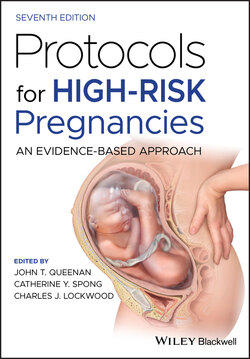Читать книгу Protocols for High-Risk Pregnancies - Группа авторов - Страница 41
Overview
ОглавлениеAneuploidy refers to an abnormal number of chromosomes, e.g., the presence of more or fewer than the usual diploid complement of 46. Presence of a single additional chromosome is known as trisomy and is an important cause of congenital malformations. The most common autosomal trisomies are Down syndrome (trisomy 21), Edward syndrome (trisomy 18), and Patau syndrome (trisomy 13). Sex chromosomal aneuploidies such as 47,XXY (Klinefelter syndrome) and 45,X (Turner syndrome) as well as an entire extra set of chromosomes (triploidy) can also be seen. In addition, deletions and duplications of portions of chromosomes also occur and can be associated with abnormalities such as DiGeorge syndrome, which results from a deletion on chromosome 22 (22q11.2), and Williams syndrome, which results from a deletion on chromosome 7 (7q11.23). Chromosomal microarray analysis can identify submicroscopic abnormalities that cannot be seen with conventional karyotyping, and these copy number variants can be associated with significant genetic diseases.
